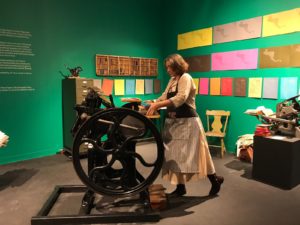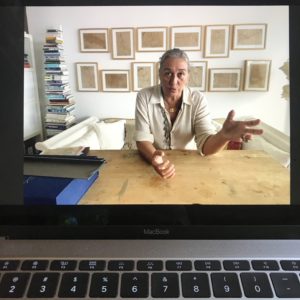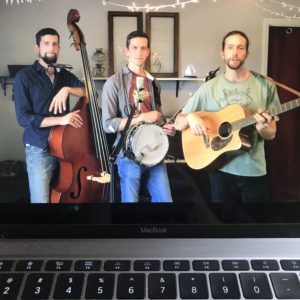I’ve put on my overalls and my hat made from sabal palm fronds: September is here and it’s planting time in Lake Worth. Mind you, this is not why your newest Convivio Book of Days calendar is late. It’s late for a number of reasons. Be that as it may, here it is: your Convivio Book of Days calendar for September. Cover star this month: Swiss chard and okra from the summer garden.
Summer is not the time of year we’re supposed to be growing vegetables here in South Florida. It’s a topsy-turvy place in many ways compared to the rest of the country (no laughing, please) and gardening is one of them. We plant in September, harvest all winter long. But come May, conventional wisdom says we lay down the hoe and take a break. But it’s been a strange year, to say the least, and Seth and I, we figured if we’re going to be spending so much time at home, anyway, we may as well plant an experimental summer garden and tend to it best we can. Some crops were an utter and complete failure within a few weeks of sowing seeds: squashes, cucumbers, pole beans, celery. Others, however, well… let’s just say the okra is thriving, as are the beets and the rocket and that Swiss chard. Swiss chard, of all things! How can something so alpine-sounding do so well in the heat and humidity of a Florida summer? Things botanical will always amaze me. And I couldn’t be more pleased: I love Swiss chard. I cook it up like my mom and grandma did (and probably their moms and grandmas): chopped and boiled up in a bit of garlicky tomato, olive oil drizzled on top, seasoned with salt and pepper. Serve it up with some crusty bread, and you have a meal fit for royalty (certainly of the alpine variety).
Speaking of alpine things, it is Drive Down Day today, this 8th of September, in Switzerland and Austria: it is the Feast of the Nativity of Mary and this is traditionally the day that the sheep and cows are driven back from their summer grazing in the mountain meadows to their winter quarters in the valleys below––another sign of summer’s waning. This is done with great pomp and celebration, the animals all adorned in flowers and bells. Across the border in Italy the folks like to eat blueberries today: blue, the traditional color of Mary’s cloak, at least in Italian Renaissance paintings. Lights are illuminated in windows, and bonfires blaze. In France, Mary is celebrated today, in the midst of the grapes ripening on the vine, as Our Lady of the Grape Harvest. Bunches of grapes are brought to churches for the priests to bless and you’ll find lots of grapes this day in the hands of statues of Mary, placed there by Marian devotees and by lovers of wine and by traditionalists like me.
In this house, though it’s not traditional, but because there is so much of it, the day will certainly involve Swiss chard. I can tell you there’s nothing in the world like opening the garden gate, gathering an armful of chard, and cooking it up for lunch. A great sense of accomplishment and self sufficiency accompanies the meal, making it even more delicious. Plus it is a great portal to memory. I think of Grandpa, who always kept a garden each summer, and I think of Grandma, who cooked the harvest with Mom, and I think as well of Maria, the farmer on Franklin Avenue near our home, an old woman from Italy with rough weathered hands. We would enter her dark wooden farm stand on the driveway, Mom and me. If I remember right, the stand was painted green. Mom would gather what she wanted, and sooner or later, Maria would walk down from the house or the fields to chat as she wrapped Mom’s purchases in newspaper and jute twine. Grandpa just grew the essentials: tomatoes, peppers, eggplant, basil, flat leaf parsley, rocket. But Maria: she grew the Swiss chard.
This is September, the first of the “Ember” months, as I like to call them. Seth and I, we wish you a fine one.
NEW IN OUR CATALOG!
Beautiful Protective Face Masks from Chiapas
We’re so excited about these new additions to our Convivio by Mail catalog: protective face masks, in all sorts of beautiful embroidered patterns, made for us by an extended artisan family in Chiapas. When their traditional source of income––tourism to Mexico––dried up this past spring, things were looking bleak. But the patriarch of the family came up with the idea of devoting their skills toward making masks, and we’re really pleased to say that the family are now doing well and they are very busy making masks. They appreciate every order that comes in, and we are so pleased to help them get their wares out into the world. Visit our catalog and you’ll find the family’s embroidered masks in floral patterns, as well as other traditional Mexican designs: Calavera (above), Frida Kahlo, Maria Bonita, Our Lady of Guadalupe, Sugar Skull, and Otomi-Inspired patterns. $16.50 each plus Free Domestic Shipping with discount code BESAFE. Bonus special when you purchase four masks: we’ll take an additional 20% off and ship your domestic order for free (no discount code necessary for that offer). International orders? Contact us and we will see what we can do for you: mail@conviviobookworks.com.







